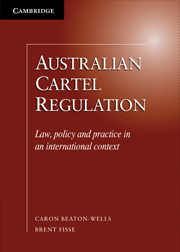Book contents
- Frontmatter
- Contents
- About the authors
- Preface
- Acknowledgements
- Abbreviations
- 1 Introduction
- 2 The legal framework governing cartel conduct
- 3 Collusion (contracts, arrangements, understandings)
- 4 Cartel and other provisions
- 5 Fault elements of the cartel offences
- 6 Individual liability for cartel conduct
- 7 Corporate liability
- 8 Exceptions
- 9 Enforcement policy
- 10 Immunity and cooperation policies
- 11 Sanctions
- 12 Compliance and liability control
- 13 Conclusion
- Appendix Trade Practices Act 1974 (Cth) Pt IV Div 1; Pt IV Div 2 s 45
- Index
Preface
Published online by Cambridge University Press: 05 December 2011
- Frontmatter
- Contents
- About the authors
- Preface
- Acknowledgements
- Abbreviations
- 1 Introduction
- 2 The legal framework governing cartel conduct
- 3 Collusion (contracts, arrangements, understandings)
- 4 Cartel and other provisions
- 5 Fault elements of the cartel offences
- 6 Individual liability for cartel conduct
- 7 Corporate liability
- 8 Exceptions
- 9 Enforcement policy
- 10 Immunity and cooperation policies
- 11 Sanctions
- 12 Compliance and liability control
- 13 Conclusion
- Appendix Trade Practices Act 1974 (Cth) Pt IV Div 1; Pt IV Div 2 s 45
- Index
Summary
This book is the product of sustained cartel activity between the authors for more than three years. Facilitating practices during 2007 led to a mutual commitment in January 2008 to tackle the host of problems raised by the exposure draft anti-cartel legislation released by the Australian government of the day. The collusion later intensified as waves of further problems rose from later exposure draft provisions and then from the legislation enacted in July 2009. Overt acts have proliferated, often at conferences and seminars and in advices. All statements in the pages ahead are those of co-conspirators. No immunity application has been made. Authorisation has not been sought.
We have tried to provide a detailed account and critique of current Australian law. The work is also intended to be constructive where better approaches are needed. The critique and the improvements proposed are informed by comparison with approaches taken in the US, Europe, Canada, New Zealand and other jurisdictions. Some of those approaches are themselves less than satisfactory and call for improvement. From that perspective, Australian cartel regulation may be seen as a test refinery of imported and locally produced concepts. We leave it to readers to judge whether the resulting spirit is not only output-expanding but also welfare-enhancing.
Many have been knowingly concerned in this project. Some have counselled our thinking on particular issues. Others have contributed by answering questions, making comments and providing references. None has relieved us from full responsibility. We are grateful to all who have assisted. Special mention should be made of Philip Williams, who fielded our toughest questions on economic issues. We are indebted also to our research assistants – Christopher Tran, Kathryn Tomasic, Neil Brydges, Janette Nankivell and Susan Cirillo. Finally, the book would not have been written but for the patience and support of Michael, Clare and Mikey, and Heidi, Oscar and Bertie.
Limitation period: the law and policy stated is current as at 30 June 2010.
Caron and Brent
Melbourne, Sydney
August 2010
- Type
- Chapter
- Information
- Australian Cartel RegulationLaw, Policy and Practice in an International Context, pp. xxiii - xxivPublisher: Cambridge University PressPrint publication year: 2011

